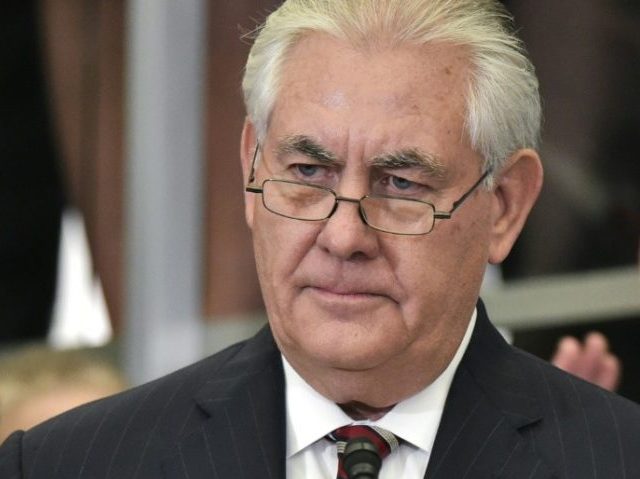North Korea launched another ballistic missile on Wednesday morning – or at least they tried to, since the Pentagon is now judging the test a failure, because the missile did not reach Japanese waters. Fox News quotes a U.S. official saying the missile might have “pinwheeled in flight.”
Furthermore, it doesn’t even look like much of a “test,” because a defense official told Fox it was an older SCUD missile, not one of the new weapons North Korea has been working on.
Secretary of State Tillerson’s official response to the North Korean provocation suggested he was not provoked. His statement was exactly 23 words long: “North Korea launched yet another intermediate range ballistic missile. The United States has spoken enough about North Korea. We have no further comment.”
This unprovoked response to North Korea’s flaccid provocation was, in turn, highly provocative to Chris Cillizza of CNN, who suffered a complete meltdown on Wednesday morning:
That’s a total of 23 words, if you’re counting. Twenty-three words that leave you more confused when you get to the end of them than when you started. Is Tillerson trying to talk tough? Or is he refusing to give North Korea the attention he thinks they’re trying to grab in advance of the US-China meeting? Somewhere in between? Neither? Both?
The statement reads, to channel Winston Churchill, like a riddle, wrapped in a mystery, inside an enigma. It’s Ernest Hemingway but for complicated and delicate matters of foreign policy. It’s, in a (hyphenated) word, a head-scratcher.
The rest of Cillizza’s column collapsed into a long argument with himself about whether diplomatic ambiguity is “dangerous” because “misunderstandings can cause international incidents,” or if Tillerson’s brevity was an appropriate expression of the Trump administration’s tough new “time for talking is over” stance toward Pyongyang.
At roughly the same time, CNN was running another article from James Griffiths which noted Tillerson might have been doing the right thing by ignoring the “airborne middle finger” from Pyongyang ahead of the summit between President Trump and President Xi Jinping of China, and it doesn’t much matter what Western powers say about North Korea’s behavior anyway:
The test, which sent a missile into the sea off North Korea’s east coast Wednesday, occurred ahead of a hugely important meeting between the leaders of the US and China this week and has been described by one analyst as an insult from Pyongyang to US President Donald Trump and his Chinese counterpart Xi Jinping.
“It was an airborne middle finger to Trump and Xi before they sit down for their summit,” said Euan Graham, director of the international security program at Australia’s Lowy Institute.
The US response, delivered via Secretary of State Rex Tillerson, was short and sharp — “The United States has spoken enough about North Korea”. It was very different from previous lengthy, threat-laden responses.
And while Tillerson’s taciturn comments were instantly criticized online, analysts said it was difficult to gauge if his approach would make much of a difference compared to his predecessors’.
Is the contrary argument that Trump would be somehow giving Kim Jong-un the green light to nuke half of Asia by refusing to respond at length to every missile launch, no matter how half-hearted the provocation? As the Fox News report points out, many analysts believe North Korea is preparing for another nuclear weapons test, possibly during Xi’s visit to Washington. Perhaps saving the strong words for that will better convey the seriousness of the new administration’s approach.
Coincidentally, former CIA director Michael Hayden gave a speech at Johns Hopkins University’s School of Advanced International Studies on Tuesday in which he warned North Korea could become capable of hitting Seattle with “an indigenously produced nuclear weapon aboard an indigenously produced intercontinental ballistic missile” before President Trump leaves office.
Hayden said it would be “probably a low-probability shot” if North Korea actually launched a nuclear missile at Seattle, but stressed there was an “inexorability” about their developing the capability.
Yonhap News reports that Hayden also quoted former Director of National Intelligence James Clapper’s assessment that Pyongyang would be “crazy” to halt its nuclear program after the effort already devoted to it, and China regards North Korea as a “bad toothache” it can generally ignore. He suggested China’s attitude could be changed by making “the toothache hurt more,” with measures such as deploying the THAAD anti-missile system in South Korea, and perhaps Japan.
U.N. Ambassador Nikki Haley has explicitly described the Trump administration’s approach to China and North Korea in these terms: “I think the United States has seen China, for 25-plus years, say that they’re concerned about North Korea, but we haven’t seen them act like they’re concerned about North Korea. I think this administration wants to see them act, and they’re going to pressure them to do that. Hopefully China will respond favorably, because we know at the end of the day, the only one that North Korea’s really going to respond to is China.”
Fox News quotes Ralph Cossa of the Pacific Forum CSIS joking that North Korea “doesn’t mind being hated, but they definitely hate to be ignored.” Tillerson’s supporters applaud him for giving Pyongyang what it hates. It will be up to President Trump to work on Beijing’s toothache while President Xi is in Washington.

COMMENTS
Please let us know if you're having issues with commenting.